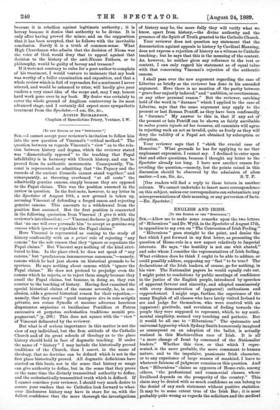[To THE EDITOR OF THE " SPECTATOR."3,
SIE,—I cannot accept your reviewer's invitation to follow him into the new question of Yincenzi's "critical method." The question between us regards Yincenzi's " view " as to the rela- tion between history and dogma, which the reviewer stated was "diametrically opposed" to the teaching that Papal infallibility is in harmony with Church history, and can be proved from its authentic monuments. Consequently, Yin- cenzi is represented as admitting that "the Papacy and the records of the ancient Councils cannot stand together," and consequently, as throwing overboard " at all costs" the admittedly genuine canons, simply because they are opposed to the Papal claims. This was the position assumed in the review in question. In the foot-note, however, to my letter in the Spectator of August 10th, a new ground is taken up, accusing Vincenzi of defending a forged canon and rejecting genuine canons. This amounts to a withdrawal from the position first assumed. But the first position is reasserted in the following quotation from Vincenzi (I give it with the reviewer's interlineation) :—" Vincenzi declares (p. 298) frankly that no one will ever persuade him' to accept as genuine any canons which ignore or repudiate the Papal claims " Here Vincenzi is represented as coming to the study of history confessedly with an a priori rule of rejecting " any canons" for the sole reason that they "ignore or repudiate the Papal claims." But Vincenzi says nothing of the kind attri- buted to him. In the place cited, he does not speak of " any canons," but "prmfatorum innumerorum canonum,"—namely, canons which he had just shown on historical grounds to be spurious. He says nothing about canons which "ignore the Papal claims." He does not pretend to prejudge even the canons which he rejects, or to reject them simply because they assail the Papal claims, but because, in doing so, they run counter to the teaching of history. Having first examined the special historical claims of the canons severally, he, in con- clusion, adds a general historical reason for their rejection,— namely, that they assail " quod tantopere sive in suis scriptis privatis, seu coram Synodis et maxime adversus hereticos disputantes ssepissime et lucidissime Pontifices et Patres successiva et perpetua ecclesiastica, traditione muniti pro- pugnarant." (p. 298.) This does not square with the " view " of Vincenzi delineated by the reviewer.
But what is of serious importance in this matter is not the view of any individual, but the firm attitude of the Catholic Church and of its great schools of theology as to the place history should hold in face of dogmatic teaching. If under the name of " history" I may include the historically proved traditions of the Church, then I assert, in the name of theology, that no doctrine can be defined which is not in the first place historically proved. All dogmatic definitions have started on this basis, not in the sense that history or usage can give authority to define, but in the sense that they prove at the same time the divinely transmitted authority to define, and the ecclesiastically transmitted truth which is defined. If I cannot convince your reviewer, I should very much desire to assure your readers that we Catholics look forward to what- ever disclosures history may have in store for us, with the fullest confidence that the more thorough the investigations of history may be, the more fully they will verify what we know, apart from history,—the divine authority and the presence of the Spirit of Truth granted to the Catholic Church.
Your reviewer does not question my statement that the denunciation against appeals to history by Cardinal Manning, does not express a rejection of history as a witness to Catholic teaching ; but he says that this is the meaning of the context. As, however, he neither gives any reference to the text or context, I can only regard his statement as of equal value with that concerning Vincenzi's rejection of the authentic- canons.
I shall pass over the new argument regarding the case of Liberius as briefly as the reviewer has done in his amended argument. Here there is no mention of the parity between " grave fear unjustly induced," and " ambition, or covetousness, or any other personal reason." But the reviewer, catching- hold of the word in " durance " which I applied to the case of Liberius, says that the same argument may apply to the present or last Roman Pcntiff, as they have been confessedly in " durance." My answer to this is, that if any act of the present or late Pontiff can be shown as fairly ascribable- to metus gravis injuste ad hoc incussus, all canonists will agree in rejecting such an act as invalid, quite as freely as they will deny the validity of a Papal act obtained by subreption or- obreption.
Your reviewer says that I " shirk the crucial case of Honorius." What grounds he has for applying to me that- unpleasant expression, I cannot say. I declined to enter upon that and other questions, because I thought my letter to the Spectator already too long. I have now another reason for- avoiding the question,—namely, lest the points raised in this
should be obscured by the admission of alien- [Our readers will find a reply to these letters in another column. We cannot undertake to insert more correspondence on this subject, unless our correspondents can substantiate any misrepresentations of their meaning, or any perversion of facts. —En. Spectator.]


































 Previous page
Previous page